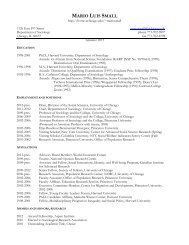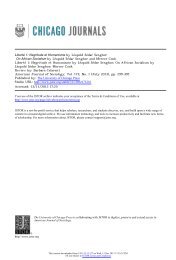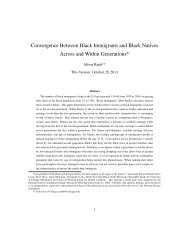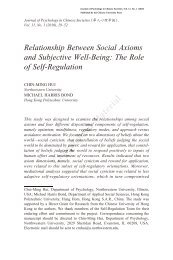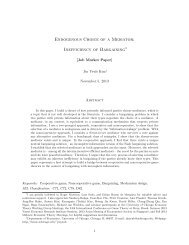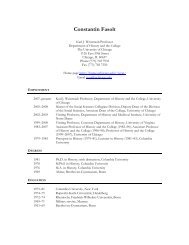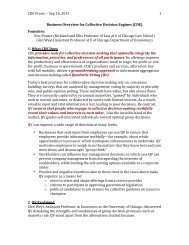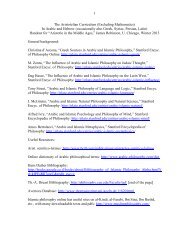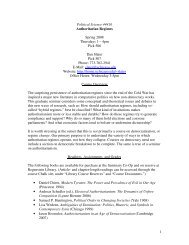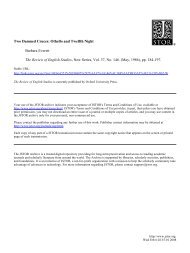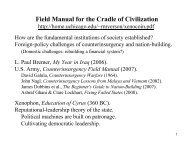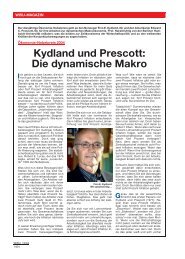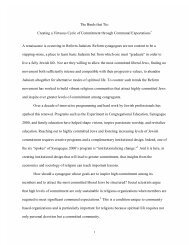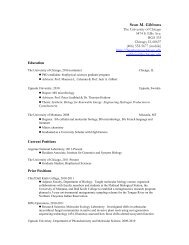Guide to the Study of Early Modern European History For Students ...
Guide to the Study of Early Modern European History For Students ...
Guide to the Study of Early Modern European History For Students ...
You also want an ePaper? Increase the reach of your titles
YUMPU automatically turns print PDFs into web optimized ePapers that Google loves.
I. INTRODUCTION<br />
I first wrote this guide in 1991. Since <strong>the</strong>n, I have kept revising it, mostly by adding<br />
new items <strong>to</strong> <strong>the</strong> lists <strong>of</strong> books, articles, and <strong>to</strong>ols <strong>of</strong> research that attracted my attention at<br />
one point or ano<strong>the</strong>r for one reason or ano<strong>the</strong>r. Over time, <strong>the</strong>se lists have grown <strong>to</strong>o long.<br />
They have also been superseded by a great deal <strong>of</strong> information that is now available online. I<br />
have <strong>the</strong>refore put <strong>to</strong>ge<strong>the</strong>r shorter and more focused lists <strong>of</strong> readings that will give you a<br />
more specific sense <strong>of</strong> what I expect you <strong>to</strong> know if you are studying with me.<br />
But this document is <strong>the</strong> only place where I've put my understanding <strong>of</strong> <strong>the</strong> purpose<br />
<strong>of</strong> <strong>the</strong> oral exam in writing, given a systematic account <strong>of</strong> <strong>the</strong> different kinds <strong>of</strong> knowledge I<br />
want you <strong>to</strong> acquire, and described what I regard as <strong>the</strong> most effective ways in which you<br />
can prepare yourself for <strong>the</strong> oral exam.<br />
If you plan on taking your oral exam with me, please read this guide carefully and<br />
write a brief statement <strong>of</strong> your intent (as described below) before we meet <strong>to</strong> talk about your<br />
plans for <strong>the</strong> exam. I do not <strong>of</strong> course expect you <strong>to</strong> familiarize yourself with every<br />
bibliographical item listed below. But do read through those lists. They may bring one or<br />
ano<strong>the</strong>r item <strong>to</strong> your attention that you would o<strong>the</strong>rwise have missed and <strong>the</strong>y will give you a<br />
sense <strong>of</strong> what I have been reading or would have liked <strong>to</strong> have read over <strong>the</strong> years.<br />
II. GENERAL POINTS<br />
The purpose <strong>of</strong> <strong>the</strong> oral examination is for you <strong>to</strong> demonstrate a pr<strong>of</strong>essional grasp<br />
<strong>of</strong> early modern <strong>European</strong> his<strong>to</strong>ry. The purpose <strong>of</strong> this guide is <strong>to</strong> explain what I mean by a<br />
"pr<strong>of</strong>essional grasp <strong>of</strong> early modern <strong>European</strong> his<strong>to</strong>ry," and how you can go about acquiring<br />
one.<br />
In keeping with <strong>the</strong> limits <strong>of</strong> my research, this guide is focused on continental<br />
Europe—especially <strong>the</strong> Germanies—from <strong>the</strong> Black Death <strong>to</strong> <strong>the</strong> Peace <strong>of</strong> Westphalia. It<br />
privileges <strong>the</strong> his<strong>to</strong>ry <strong>of</strong> law and politics, legal and political thought, his<strong>to</strong>riography, and<br />
<strong>the</strong>ory <strong>of</strong> his<strong>to</strong>ry. It is informed by my conviction that <strong>the</strong> early modern period is impossible<br />
<strong>to</strong> understand without a knowledge <strong>of</strong> its place in <strong>the</strong> his<strong>to</strong>ry <strong>of</strong> Europe as a whole, and that<br />
<strong>the</strong> his<strong>to</strong>ry <strong>of</strong> Europe properly speaking begins with what R. I. Moore has called <strong>the</strong> First<br />
<strong>European</strong> Revolution, that is, <strong>the</strong> transformative two centuries after <strong>the</strong> collapse <strong>of</strong> <strong>the</strong><br />
Carolingian Empire in <strong>the</strong> tenth century, when Europe first acquired <strong>the</strong> institutions and <strong>the</strong><br />
habits <strong>of</strong> mind that have given Europe its specific his<strong>to</strong>rical character. The most important<br />
institutions are a governmental church, governmental states, incorporated cities, and<br />
incorporated universities. The most telling habit <strong>of</strong> mind is <strong>the</strong> preference for scientific<br />
objectivity most memorably singled out for attention by Max Weber, whe<strong>the</strong>r it is in <strong>the</strong> area<br />
<strong>of</strong> <strong>the</strong>ology and law, as in <strong>the</strong> Middle Ages, or in <strong>the</strong> study <strong>of</strong> nature and politics, as in<br />
modern times.<br />
Do not take any <strong>of</strong> my suggestions as writ in s<strong>to</strong>ne. They are meant <strong>to</strong> help you in<br />
your preparation for <strong>the</strong> examination and <strong>to</strong> explain <strong>to</strong> you what I expect students <strong>to</strong> know<br />
about early modern <strong>European</strong> his<strong>to</strong>ry unless I am <strong>to</strong>ld o<strong>the</strong>rwise. If you are already<br />
prepared, for example, or if you have some definite ideas <strong>of</strong> your own about how you would<br />
like <strong>to</strong> structure your field that don't agree with mine, by all means let me know. There is no<br />
inherent reason why you should have <strong>to</strong> proceed in <strong>the</strong> manner I have suggested below. The<br />
definition <strong>of</strong> your field depends on certain basic intellectual decisions that will make a<br />
4<br />
4



